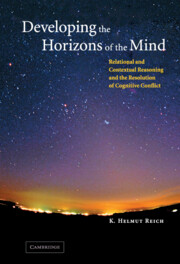 Developing the Horizons of the Mind
Developing the Horizons of the Mind Book contents
- Frontmatter
- Contents
- List of figures
- List of tables
- Acknowledgements
- Introduction
- Part I The Theory of Relational and Contextual Reasoning (RCR) and its Empirical Study
- Part II Applications of RCR
- Overview
- 6 Methodology
- 7 Religion
- 8 The Archaeology of RCR
- 9 Psychology
- 10 Education
- 11 Social Issues
- 12 Conclusions
- Appendix 1 Interviewing techniques
- Appendix 2 Scoring manual for RCR
- References
- Index
8 - The Archaeology of RCR
Published online by Cambridge University Press: 22 September 2009
- Frontmatter
- Contents
- List of figures
- List of tables
- Acknowledgements
- Introduction
- Part I The Theory of Relational and Contextual Reasoning (RCR) and its Empirical Study
- Part II Applications of RCR
- Overview
- 6 Methodology
- 7 Religion
- 8 The Archaeology of RCR
- 9 Psychology
- 10 Education
- 11 Social Issues
- 12 Conclusions
- Appendix 1 Interviewing techniques
- Appendix 2 Scoring manual for RCR
- References
- Index
Summary
In chapters 4 and 7, empirical evidence for the use of RCR was presented. Given that evidence, the question arises whether traces can be found at earlier times. Obviously, this is a somewhat speculative endeavour as I could not interview any of the persons to be discussed, and hence have not assessed their level of RCR via the standard interview procedure.
Candidates for earlier use of RCR are (i) Fathers of the Council of Chalcedon of 451, (ii;) Vincent van Gogh (1853–90), (iii) William James (1842–1910), (iv) Rainer Maria Rilke (1875–1926), (v) Robert (Edler von) Musil (1880–1942), and (vi) Niels Bohr (1885–1962).
Fathers of the Council of Chalcedon
In 451 at the Fourth Ecumenical Council of Chalcedon, the assembled Fathers unanimously adopted the Chalcedonian Definition declaring notably that
our Lord Jesus Christ is the one and the same Son … truly God and truly man … made known in two natures [which exist] without confusion, without change, without division, without separation; the difference in nature having been in no way taken away by way of reason of the union, but rather the properties of each being preserved, and (both) concurring into one person (prôsopon) and one hypostasis.
(Sellers 1953, pp. 210–11)I hypothesise that this was an early application of RCR. The arguments (Reich 1990b) are mainly that (1) the above wording was formulated by a few ‘expert’ bishops within a few days, the centrepiece being the ‘paradoxical’ expressions without confusion, without change, without division, without separation.
- Type
- Chapter
- Information
- Developing the Horizons of the MindRelational and Contextual Reasoning and the Resolution of Cognitive Conflict, pp. 133 - 144Publisher: Cambridge University PressPrint publication year: 2002


